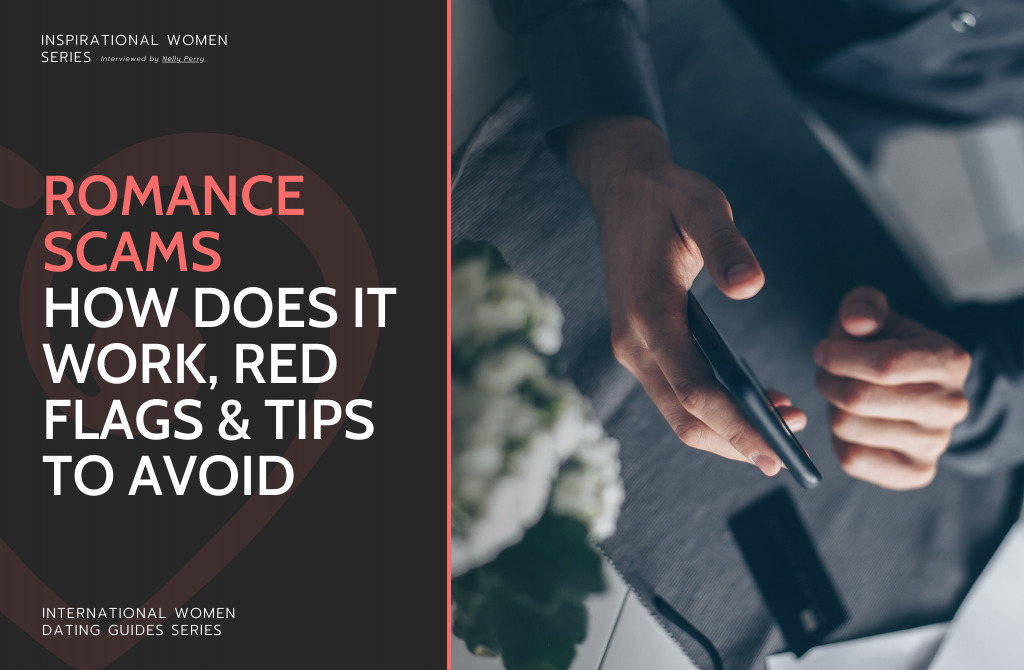Romance Scams in 2026: How Does It Work, Red Flags & Tips to Avoid

What are romance scams? How do romance scams work? Is it possible to build a real online relationship and how to not lose money? Read this guide and you’ll get all the answers.
What are romance scams?
The romance scam is a type of scam involving romantic intentions, gaining the attention of the victim, and using the victim’s affection and attention to commit fraud against them. There are lots of types of this cam, from identity theft to stealing the money directly from a PayPal wallet.
Here, we’ll tell you everything you need to know about romance scams and about how to not become a victim.
How do romance scams work?
Let’s talk about the most common romance scams an American user may fall victim to. Here they are:
- Fake dating sites. They look like real online dating apps, they have a lot of beautiful women who are eager to chat with you, but you need to buy credits or a premium subscription first. The only goal of such websites is to make you pay—you’ll never meet these girls IRL, you can only meet online, because they simply don’t exist. It’s the website staff chatting with you on such platforms.
- The “Send me money” romance scam. It’s not like they just say “send me money”. That would be unreasonable, and not all scammers are naive and silly—if they were, how do they make millions of Americans lose money every year? They can come up with interesting stories to get your money, from something like: “I need to buy a new smartphone because mine has just died” to complex lies like: “I need to pay the duty or marriage taxes to marry you”. But the most common type of story is related to a medical emergency (“I’m in a hospital, help me with medical expenses”).
- Contacting you outside the dating service. It’s like a “Financial Assistance” scam where a victim gets an email from a fake “Financial Assistance Department” and voila, his PC is infected after opening the attachment to the email. In short, you start getting messages with images or videos attached from a woman you were chatting with on a dating site or from other ladies who claim they found your profile on the same site. You open the attachments, and after that, there’s a wide spectrum of possibilities! Your PC may be infected with anything—it can, for example, become a part of a botnet, your logs can be stolen, and all the accounts you have, from bank accounts to your Airbnb account, can be stolen, too.
- Blackmail. It can be sextortion or other types of blackmail. The point here is: if you share too much personal information and then someone threatens to tell this information to other people, this is it. You have just fallen victim to blackmail fraudsters.
- Stealing your financial details. Typically, they don’t just ask for a credit card number or for a PayPal password. What’s more, your credit card number alone is not that interesting for a scammer—but if they get your CVV/CVC code, things will go much worse.
As for financial information, it’s not like they just directly send money from your credit card to their one. It doesn’t work like this (but this can work with your PayPal account, though). With a credit card, scammers are more likely to buy something expensive using your card details. Like, they buy a brand new laptop for $2,500, get it shipped to one of their warehouses, and sell it immediately for half of the price—you lose $2,500, they get $1,250. Or, they can use your shipping address (that’s why you need to be careful with this info, too), request the rerouting of a shipment, and receive it using a fake ID.
There are lots of types of financial fraud, but the main rules you need to know are: never share this information and only enter your CC/PayPal details on 100% trusted websites.

How to avoid romance scams?
Here are some useful rules that will help you avoid online dating scams:
- Don’t use social media for dating. A social media site like Facebook or Instagram may look like a good choice because there are lots of people there, and it’s free to use these sites. But in reality, social media platforms are the worst choice for dating. A good dating app doesn’t only have lots of people interested in a relationship—it most likely has professional customer support available 24/7 and at least some kind of protection/verification. A lot of trusted dating services have an ID verification tool, which basically reduces, if not eliminates, the risks of meeting a fake profile.
- Choose the most trusted dating sites with a good reputation. All the above-mentioned can only be applied to good dating platforms. Read both expert and user reviews, pay special attention to the quality of profiles, use reverse image search to find the source of a person’s photo, and test the sites yourself to make sure they are legit.
- Perform a background search. When it comes to romance scams, pictures on dating sites are usually the first thing you need to pay attention to. Always use the reverse image search by Google—as we’ve just said, it’s one of the most important things to do when choosing a dating platform or starting to chat with a person. It’s simple: if you see a lot of search results, especially if they are from other dating websites, it’s 100% a scammer. But it’s not only about photos, though! If you get access to the personal or contact information of a person you’re talking to, use all the methods available to make sure it’s a real person.
- Use antivirus of your choice. Around 50% of Americans don’t use Internet security software which means there are tens of millions of Americans who rely on Windows Defender in the best case. That’s not what you really need—online dating scams can be pretty sophisticated, and lots of scammers use self-written malware, which is extremely hard to detect.
- Update your antivirus software automatically—it’s not like updating your Windows 11 where nothing really changes; updating antivirus means updating databases which, in turn, means more opportunities to spot a threat.
- In case you have something to hide—something like 10 Bitcoins—buy a cold wallet. Keyloggers and other malware allow the hacker to see your private keys, and you know what’s going to happen immediately after that.
- Follow the basic cyber hygiene rules—use complex passwords and don’t use the same password, use two-factor authentication everywhere where it’s possible, do not click on suspicious links or email attachments, etc.
- Be extra careful after potential contact with a scammer. If you feel like something might have happened, be extra cautious. Change the passwords, run a system check, think of getting a credit card with a dynamic CVV/CVC code (in this case, it will be impossible for scammers to do anything with it), etc.
But what should you do if you’ve come here too late and already lost money to a scammer? Here’s a short guide for you to not lose even more money:
- Stop communicating with a romance scammer
- Run a full system check if you got scammed using your PC and change all the passwords after that (contact a trusted computer professional to help you, not all malware can be detected by antiviruses)
- Contact your bank if you made a bank transfer or shared your credit card details—yes, this might hurt your credit, but you will probably get your money back, and the alert will expire after a year. Contact immediately!
- Report to the Federal Trade Commission and to the FBI
And remember the behavior of a scammer who made a trap for you—pay attention to the same behavior the next time you contact people on social media or dating websites.
What to look out for in romance scams and how to avoid them?
So, what else to know and how to prevent romance scams? Continue reading to find out.
- Never share too much personal information. When it comes to financial information, it’s like 0% of that information you can share on an online dating site—under no circumstances a person on a dating service would even need your credit card number. But when we’re talking about your personal info, it’s important to feel the balance between having a conversation and telling someone too much about yourself.
- Be extra careful and use common sense. Romance scammers prey on emotions, you should not let your emotions prevail over logic. If a woman who looks like a top model tells you she’s falling for you in her 3rd message, there’s definitely a problem here.
- If a person has somehow convinced you to send money, and you are 200% sure they are real, and their story is real, well, let it be so. But please, send it via bank transfer, PayPal, or maybe Venmo, but not the wire transfer, and, of course, not crypto. If it’s a bank transfer, the bank eventually reverts the money, but if you send someone money via cryptocurrency or a wire transfer, it’s impossible to get it back.
By the way, another common question a lot of users have is: How long do romance scams usually last?
It depends on a romance scammer you’re facing and on their goals. We definitely can’t say something like “if a person is chatting with you for 3 days and starts acting weird, it’s 100% a scammer”, no. There’s no 3-day rule here. You may meet a dedicated scammer with a developed “Social Engineering” skill who would be dedicated enough to spend a week chatting with you without any red flags. On the other hand, you may also meet scammers who would ask for money quickly, in 1-2 days or even faster.

The romance scams red flags to search out for
In short, red flags are the warning signs that can indicate scam. Let’s talk about them.
1. “Trusted” profiles
Some dating platforms have 100% or “Trusted” or “Verified” profiles—and this can be a problem because that’s the tactic the creators of fake dating websites love to use. Our advice here is: try to verify your profile on that website. If it’s impossible, close that site and never use it again.
2. They hook you with some common interests
It’s one of the most common romance scams red flags, actually. Here’s how it looks: you start chatting with a person, and it turns out this person listens to the same music as you, loves the same movies you do, and so on. It’s not impossible, obviously—miracles happen sometimes. This flag is not that red, in fact, but only if it’s the only flag on that flagpole. If there are two or more of them, this is an indicator that something is wrong—maybe that’s how a scammer wants to win your confidence.
3. They become overly emotional very quickly
Another “not-too-red” flag here. Some people are just too emotional, that’s ok—but if they are, say, too emotional+ask you for something suspicious+ask you for money, that’s surely a huge problem.
4. Asking for money
That’s How To Avoid Romance Scams 101, basically. This flag is so red it could represent communism—if someone is asking you for money online, it’s a 99.99% romance scam.
5. Asking for suspicious activities
The spectrum of activities is very wide—sending inappropriate photos and videos, sharing your bank details, receiving a package without opening it, etc, etc. If your online date asks you for suspicious stuff, something is most likely wrong with all this situation.
6. Introducing you to relatives, business partners, etc…
… Too quickly. This is not a romance scam thing, actually. But if you’re really interested in a relationship with a person and this person introduces you to their family, friends, and colleagues right away, there’s another problem. It’s not so serious because, as we’ve said, miracles happen. But again, something is wrong here, and if anything is wrong during the online dating stage, it’s definitely a warning sign.
7. Making broken promises
Just like the #2 and #3 warning signs, this one is not basically a red flag if it’s the only sign you observe. It’s just not something that will make your online relationship pleasant and enjoyable; that’s the point. If a person breaks promises constantly, this means either they don’t care about you or are not committed to this relationship. In all these cases, this can be a problem, which might spoil your online dating experience.

Online romance scams are a very serious problem. In 2022, the reported losses of Americans due to romance scam were incredibly high—around $1.3 billion. Do not take it lightly, please: the online dating world can be too dangerous, unfortunately. Follow the safety rules, take things slowly, insist on a face-to-face meeting, and be careful—and you’ll definitely find the right person online.
FAQ about Romance Scams
There are no websites we can mention as the ones with the biggest number of scammers. The thing is, it’s not the sites that are lying to people, it’s people who are lying to each other. So you should just be careful when providing anything on the internet—from personal information to money.
It’s Nigeria, India, Romania, Indonesia, Russia, and South Africa. But it’s not like the scammers from a certain country use the dating websites focused on women from this country—it’s an international thing, and you can meet Russian or Indian scammers on a Filipino or Colombian dating site easily.
Most scammers just come up with stories like “my parents are in a hospital, please, send money”. Some of them invent more sophisticated schemes: they may blackmail you, contact you outside the dating site, and even create a fake dating website with the only goal of making you pay for communication.
There’s no such thing as an average lifespan of a romance scam. In our opinion, however, it’s around 1-7 days. In general, it makes no sense for a scammer to spend so much time trying to scam one person, and it’s typically difficult to maintain the image for too long.



